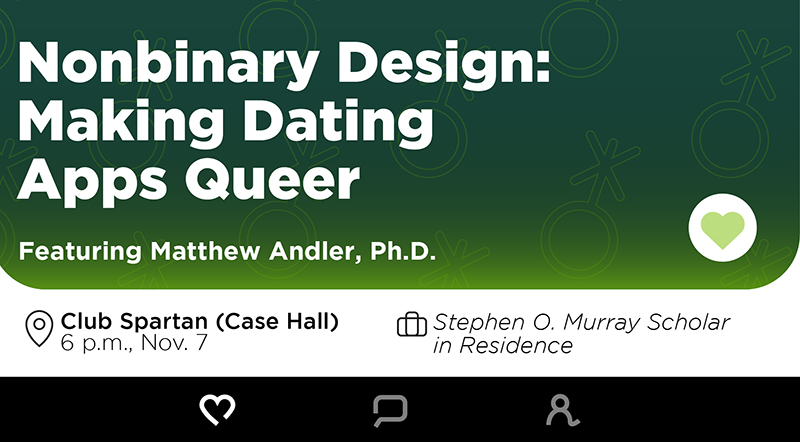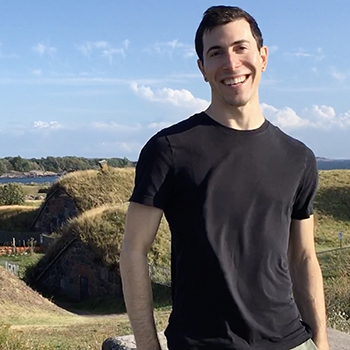Murray Scholar’s second visit provides discourse on dating apps
November 22, 2022 - Beth Brauer
James Madison College’s Stephen O. Murray Scholar in Residence Matthew Andler visited Michigan State University’s campus for the second time early this month. During Andler’s visit (Nov. 3-8), he presented research that discusses the ethics of dating apps.
The Boston Review article “Nonbinary Design: Making Dating Apps Queer,” is part of a larger project of Andler’s that examines different aspects of the social world for the purpose of promoting gender justice.

In addition to delivering a public discussion on Nov. 7, Andler spoke to all three sections of Assistant Professor Melissa Fore’s MC111 course, which explores issues of identity. During the hourlong discussion, students had an opportunity to ask Andler questions about his ideas of inclusivity relative to dating apps and share their observations about the impact of social media and apps on their dating habits.
In response to Andler’s critique that dating apps perpetuate the commodification of dating, JMC first-year student Emilio Perez Ibarguen wondered whether partnering is more commodified today than during previous generations.
“I was attempting to critique assumptions that ‘pure love’ has ever existed,” Perez said.
In a follow-up email, Perez explained, “Despite what we tell ourselves, [partnering] has never really been about love. Essentially, dating has always been commodified; the only differences throughout history have been the attributes we deem most important.
This isn’t to say that love doesn’t exist; I just think we’re kidding ourselves if we pretend love used to be our number one priority and now, we’ve minimized its importance with dating apps,” said Perez.
The notion that people must choose from a menu of options when “ordering” (searching for) a partner, according to Andler, raises some important questions. “Design choices are ethically significant. The design of an object, material space or social media application — including its algorithms — can affect what we come to care about,” Andler said.

Andler’s broader argument is that we ought to question whether technology is used for good. How we relate and think about one another matters, and when we are taught to think about partnering and relationships in binary terms, anything that deviates becomes “othered,” which has implicit biases and can be damaging.
As Andler states in the article, “Even apps specifically designed for queer people tend to be aimed at a very narrow user base.” He also argues, “Part of the problem is that dating applications tend to be designed in ways that force queer users to mispresent their own experiences.”
Tabitha Garza, a first-year student who participated in one of Andler’s MC111 discussions, felt that eliminating gender filters on dating applications, as discussed by Andler, would be interesting, and she thinks that society should focus less on gender identification. “Dating apps like Tinder should work to create a more inclusive experience, particularly for queer people,” said Garza.
Most dating apps appear to be designed with a particular type of user in mind, but Andler provides an alternative: “Design features can be changed. There is a possible world — a nearby possible world — where we exercise much more democratic influence on technological development.”
Andler returns to JMC during the spring semester (March 16-22) and will be discussing conceptions of masculinity during his final public talk. Date and time to be determined.

